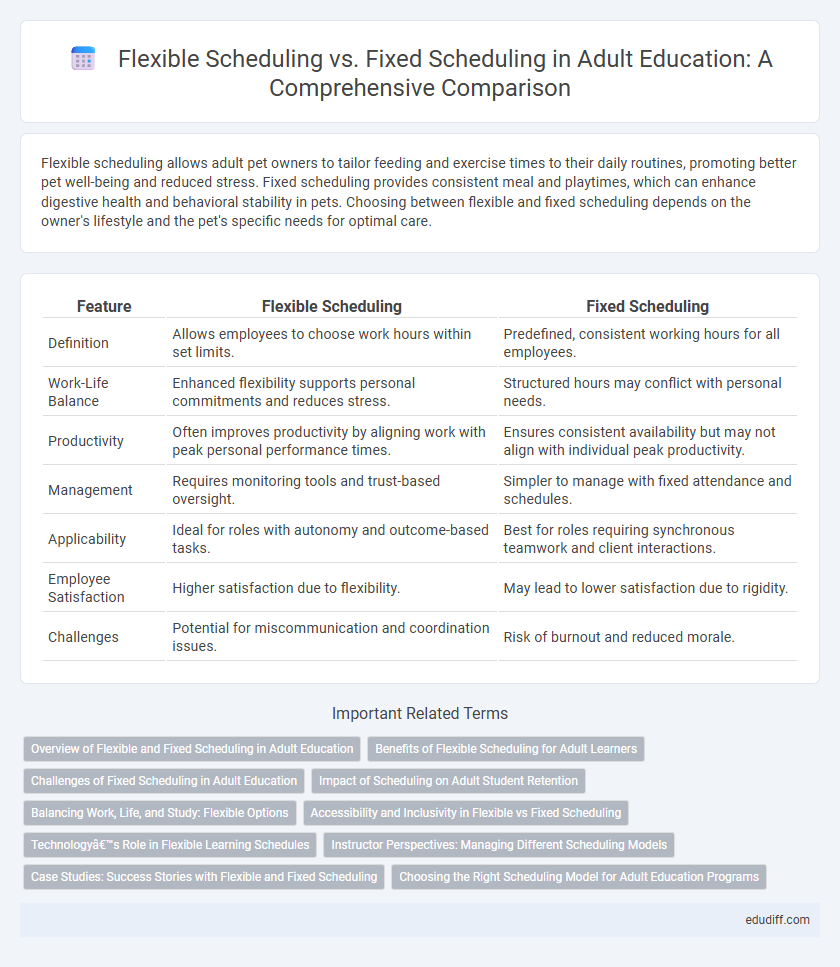Flexible scheduling allows adult pet owners to tailor feeding and exercise times to their daily routines, promoting better pet well-being and reduced stress. Fixed scheduling provides consistent meal and playtimes, which can enhance digestive health and behavioral stability in pets. Choosing between flexible and fixed scheduling depends on the owner's lifestyle and the pet's specific needs for optimal care.
Table of Comparison
| Feature | Flexible Scheduling | Fixed Scheduling |
|---|---|---|
| Definition | Allows employees to choose work hours within set limits. | Predefined, consistent working hours for all employees. |
| Work-Life Balance | Enhanced flexibility supports personal commitments and reduces stress. | Structured hours may conflict with personal needs. |
| Productivity | Often improves productivity by aligning work with peak personal performance times. | Ensures consistent availability but may not align with individual peak productivity. |
| Management | Requires monitoring tools and trust-based oversight. | Simpler to manage with fixed attendance and schedules. |
| Applicability | Ideal for roles with autonomy and outcome-based tasks. | Best for roles requiring synchronous teamwork and client interactions. |
| Employee Satisfaction | Higher satisfaction due to flexibility. | May lead to lower satisfaction due to rigidity. |
| Challenges | Potential for miscommunication and coordination issues. | Risk of burnout and reduced morale. |
Overview of Flexible and Fixed Scheduling in Adult Education
Flexible scheduling in adult education allows learners to choose class times that accommodate work, family, and personal commitments, enhancing accessibility and retention rates. Fixed scheduling requires students to adhere to predetermined class times, providing structure but potentially limiting participation for adults with variable availability. Both approaches impact learner engagement, with flexible scheduling often yielding higher completion rates due to its adaptability to adult learners' diverse lifestyles.
Benefits of Flexible Scheduling for Adult Learners
Flexible scheduling enables adult learners to balance education with work, family, and personal commitments, enhancing accessibility and reducing stress. This adaptability supports diverse learning paces and styles, fostering higher retention and engagement. Institutions offering flexible scheduling often report increased enrollment and completion rates among adult students, demonstrating its effectiveness in adult education.
Challenges of Fixed Scheduling in Adult Education
Fixed scheduling in adult education often leads to challenges such as limited accommodation for learners' diverse work and family commitments, resulting in decreased attendance and engagement. The rigidity of fixed schedules can cause conflicts with adults' unpredictable responsibilities, reducing their ability to consistently participate in courses. Lack of flexibility may also hinder adult learners from effectively balancing education with other life demands, negatively impacting retention and success rates.
Impact of Scheduling on Adult Student Retention
Flexible scheduling significantly improves adult student retention by accommodating work and family commitments, reducing drop-out rates caused by rigid time constraints. Fixed scheduling often leads to higher absenteeism and course withdrawals among adults juggling multiple responsibilities. Institutions adopting flexible scheduling models see increased enrollment persistence and overall academic success in their adult learner populations.
Balancing Work, Life, and Study: Flexible Options
Flexible scheduling offers adults the ability to tailor work and study hours around personal commitments, enhancing productivity and reducing stress. Fixed scheduling provides structure but may limit opportunities for spontaneous adjustments needed to balance family and educational responsibilities. Choosing flexible options supports a healthier work-life-study integration, promoting well-being and academic success.
Accessibility and Inclusivity in Flexible vs Fixed Scheduling
Flexible scheduling enhances accessibility by accommodating diverse adult learners' varying work, family, and health commitments, enabling participation without rigid time constraints. Fixed scheduling often limits inclusivity, as fixed time slots may exclude individuals with non-traditional work hours or caregiving responsibilities. Greater inclusivity in flexible schedules supports broader educational access and equitable opportunities for all adults.
Technology’s Role in Flexible Learning Schedules
Technology transforms flexible scheduling by enabling asynchronous learning through digital platforms, allowing adult learners to access courses anytime and anywhere. Mobile apps, cloud-based tools, and interactive learning management systems support personalized pacing and real-time progress tracking, enhancing engagement and retention. Artificial intelligence further tailors content delivery based on individual performance, optimizing flexible learning schedules for diverse adult education needs.
Instructor Perspectives: Managing Different Scheduling Models
Instructors managing flexible scheduling value autonomy in tailoring class times to accommodate diverse adult learners' needs, enhancing engagement and attendance. Fixed scheduling offers structure and predictability, simplifying curriculum delivery and administrative coordination but can limit responsiveness to individual learner circumstances. Balancing these models requires instructors to optimize resource allocation while maintaining educational quality and learner satisfaction.
Case Studies: Success Stories with Flexible and Fixed Scheduling
Case studies reveal that flexible scheduling enhances employee productivity and satisfaction, with companies like Google reporting up to 30% increased performance metrics. Fixed scheduling, while offering structured workflows, often results in 15% higher absenteeism rates according to a Harvard Business Review study. These insights highlight the pragmatic benefits of flexible scheduling in fostering workplace engagement and operational efficiency.
Choosing the Right Scheduling Model for Adult Education Programs
Flexible scheduling in adult education programs accommodates diverse learner needs by allowing classes at varying times, enhancing accessibility for working adults and those with family commitments. Fixed scheduling offers consistent, structured class times that benefit learners who thrive with routine and predictability, facilitating regular attendance and time management. Selecting the appropriate scheduling model depends on balancing flexibility with structure to optimize learner engagement, retention, and program outcomes.
Flexible scheduling vs Fixed scheduling Infographic

 edudiff.com
edudiff.com